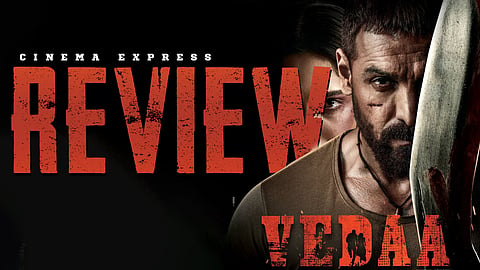Vedaa Movie Review: A mixed bag of kinetic action and message-heavy drama
Vedaa (2.5 / 5)
Nikkhil Advani's action film Vedaa stars John Abraham as Major Abhimanyu Kanwar, an Indian Army officer who goes back to his late wife's home town after facing expulsion from service through a court martial. The film begins in a North Indian village instead of immediately thrusting us with Major Abhimanyu in Kashmir. Vedaa is a film that wastes little time to establish that its hero is a male saviour of sorts. However, the film tries to upend the formula of the white knight saving the damsel in distress. In the process, it tests the weight a film of its genre can carry.
Director: Nikkhil Advani
Cast: John Abraham, Sharvari Wagh, Abhishek Banerjee, Ashish Vidyarthi, Kumud Mishra
The film opens with a stark portrayal of caste-based oppression in a village called Barmer. It is a place where casteist bigots such as Suyog Pratap Singh (Kshitij Chauhan) and his goons decide everything, from who gets to be part of school boxing to who marries whom. Initially, Vedaa Berwa (Sharvari Wagh) looks at the act of violence that unfolds in front of her with a quickly diminishing sense of hope. Vedaa wants to fight against the oppressors, but she realises that she cannot do it alone. Soon, she tells her sister, Gehna (Tanvi Malhara), that ‘someone’ will come to save them and their villagers. The film then jumps to Kashmir to introduce us to that someone, as he executes a covert operation. John gets an exquisite action sequence in the lead-up to the events that cause the Army to expel his character from service. After killing some terrorists, Major Abhimanyu runs after another terrorist between the huts atop the Kashmir hills. Suddenly, they merge into a group of Muslims performing namaz. The calm of a mass religious gathering immediately following the storm of bullets is a deft touch, lending some heft to the sequence where Abhimanyu tells the terrorist, “Even God is by my side.”
So it comes as a surprise when Abhimanyu, now a boxing coach at Barmer, tells village pradhan Jitendar Pratap Singh (Abhishek Banerjee) that he is an atheist. He is also a man simmering with sorrow following the loss of his wife Raashi (Tamannaah Bhatia) in Kashmir. Thankfully, Advani saves the obligatory backstory for the Major and his wife for later, as the film hops between locations. He gives just enough information for us to understand that there is something eating away at the male protagonist’s smouldering sense of external self. It is this mostly slick approach to storytelling that makes the first half of Vedaa an engrossing affair. Even amid all the breakneck action in the first half, Advani finds just enough time to establish the dynamics between John and Abhishek’s characters. Unlike Abhimanyu, Jitendar is a man with regressive principles who maintains a sinister self behind the seemingly progressive facade he projects to the outside world.
At the hands of a lesser filmmaker, Vedaa would be a straightforward mano a mano between the hero and the villain. However, Advani does not undermine the agency of his female lead. Instead, he gives Vedaa a solid, emotionally resonant character arc, one that almost upends the usual trajectory of such a story. Interestingly, Abhimanyu sees Vedaa as a reflection of his late wife, admiring her determination and courage. If the film gives an excuse for the two to be together, it provides a proper reason for us to travel with them on their journey. However, it is a bumpy ride, with Aseem Arora’s screenplay making the film descend into didacticism about the right and wrong paths to justice. The film initially captivates with its sleek narrative, but the momentum slows as it approaches the climax. Here, the male protagonists resort to aggressive measures in response to perceived injustices—one twisted, the other more upright. Advani contrasts this aggressive approach with another character seeking recourse through the Indian Constitution, representing a fundamentally different path to justice. And subtlety goes for a toss when the end credits roll up with a disclaimer about a real-life incident against oppression in India, bringing about a major change. It is as though all the speechifying was not enough.
There is also some predictability. For example, Kumud Mishra stars as an uncle who backstabs the protagonist and then plays the victim card. Abhimanyu eventually trips into the metaphoric ‘Chakravyuh’ and the characters start to quote the Mahabharata. Oddly, Vedaa is the same film where John Abraham plucks out the steering wheel of a moving car as he rides a bike parallel to it. Its mass sensibilities, with the occasionally unrealistic action, do not blend seamlessly with the intense drama.
What also does not help is the decision to have three villains in place of two solid ones. Ashish Vidyarthi does evil well, but Kaka seems like a character who left the train in Nikhil Nagesh Bhatt’s Kill to hop on to the breeding ground for oppression that is Barmer. What does Kaka add to the story that Jitendar does not, to justify such a lengthy runtime for him?
But then again, a generic film such as Vedaa could have gone wrong in many other ways. At least, the performances are terrific across the board, whether it be Abhishek as the hot-headed village head, John as the Army man with a brooding intensity, or Sharvari as the wannabe boxer who fights the long fight against systemic oppression. And the kinetic action is enjoyable, especially when the film remains slick and glides like a graceful ballet dancer doing a cartwheel. Thankfully, the film does not become problematic in an attempt to tell a male saviour story, either.

